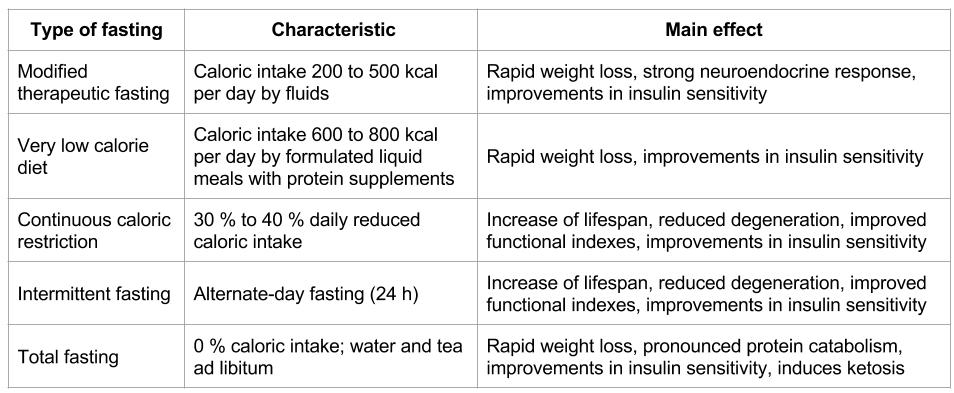 It is known that diet can have a significant influence on mood. A healthy diet has been shown to improve mood in both the short and long term. One of the reasons for this may be that poor quality diets contains metabolic poisons that may have detrimental effects on normal physiological function and this may alter brain chemistry. A healthy diet can remove many of these metabolic poisons and in this way returns the individual to health. An interesting finding in the literature is that energy restriction and fasting can also elevate mood, perhaps because they too remove the toxic burden of metabolic poisons. Studies suggest that energy restriction and fasting may be accompanied by mood elevations, improvements in psychological well being and even euphoria. The elevations in mood that accompany energy restriction and fasting have been reported in a number of studies, and these changes are often accompanied by relief from chronic pain, as well as other beneficial changes such as decreases in blood pressure and weight loss.
It is known that diet can have a significant influence on mood. A healthy diet has been shown to improve mood in both the short and long term. One of the reasons for this may be that poor quality diets contains metabolic poisons that may have detrimental effects on normal physiological function and this may alter brain chemistry. A healthy diet can remove many of these metabolic poisons and in this way returns the individual to health. An interesting finding in the literature is that energy restriction and fasting can also elevate mood, perhaps because they too remove the toxic burden of metabolic poisons. Studies suggest that energy restriction and fasting may be accompanied by mood elevations, improvements in psychological well being and even euphoria. The elevations in mood that accompany energy restriction and fasting have been reported in a number of studies, and these changes are often accompanied by relief from chronic pain, as well as other beneficial changes such as decreases in blood pressure and weight loss.

There are a number of types of fasting. The main types, and their characteristics are shown in the table above. Generally fasting involves the consumption of zero calories. In contrast, energy restriction and modified fasting involves the consumption of some calories, although the amount will vary depending on the type of diet. Both fasting and energy restriction may significantly elevate mood. Adapted from Michalsen (2010).
For example, in one study, subjects went on a 2 week modified fast that was made up of 250 kcal per day. The subjects lost weight and experienced reductions in blood pressure. In addition, 80 % of the subjects also reported decreases in depression, anxiety and exhaustion when on the diet. In another study, subjects who received 300 kcal per day lost weight, but also reported that daily mood rating increased significantly after 5 days on the fast. The elevations in mood were accompanied by decreased levels of the stress hormone cortisol. This suggests that the diet had produced an anti-stress effect on the subjects, and this may have explained the elevations in mood. In another study, an 8 day fast resulted in better sleep quality as well as improved day time concentration. In another study, subjects restricted to 350 kcal per day experienced significant improvements in mood. The researchers showed that mood elevations were most prominent in those with a genetic propensity to gain weight.
It is not fully understood why energy restriction or fasting should result in elevations of mood. One possibility is that by fasting, food allergens, metabolic poisons and other toxins contained within the diet which are the cause of detrimental neurochemical reactions may be limited. As levels of these substances drop, the neurochemistry of the brain resets itself to normal, and elevations in mood occur. Fasting can also have effects on hormone levels, and in particular, levels of the stress hormones cortisol and adrenaline may fall during fasting. Cortisol is implicated in negative changes to brain neurochemistry, and elevated levels of adrenaline may contribute to the development of anxiety. Fasting can also cause rapid decreases in the blood levels of insulin, and can significantly improve insulin sensitivity. At the same time glucagon levels increase. This might have a stabilising effect on blood sugar levels and this may elevate mood through provision of a more stable blood glucose level.

That fasting and energy restriction may elevate mood may suggest that the normal eating habits of certain individuals are responsible for their depressed mood and anxiety. Increasingly it is being shown that poor quality diets are a significant contributory factor in the development of mood disorders.
Energy restriction and fasting may also result in changes to the neurotransmitter systems on the brain. Serotonin is a neurotransmitter that is involved in both appetite regulation and in mood. Tryptophan availability, and serotonin synthesis and turnover can increase during fasting and this may explain some of the mood elevating changes seen with energy restriction and fasting. Animal studies do suggest that significant changes occur to the serotonin system during fasting, and these may affect brain chemistry and mood. Energy restriction and fasting may also increase brain levels of endogenous opioids and cannabinoids such as β-endorphin and 2-arachidonoyl glycerol, respectively. Other changes may also occur in the brain following energy restriction and fasting, such as increases in levels of neuropeptide Y, and these may also improve mood. Significant changes to brain chemistry may therefore occur with energy restriction and fasting, and the overall effect may be a to elevate mood, and decrease anxiety and depression.
Eat Well, Stay Healthy, Protect Yourself
RdB
